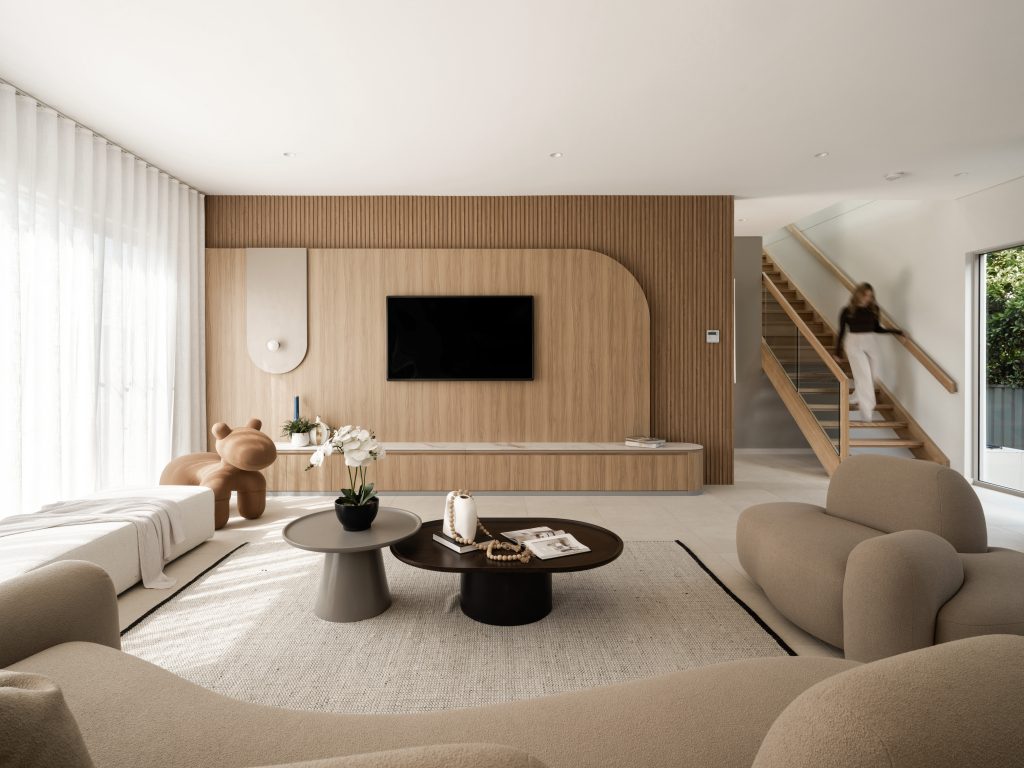While maximising space with minimalist furniture may seem like a contradiction, it’s a useful interior design practice that teaches you how to live with less. Reducing your per-room footprint to the bare essentials and prioritising functionality over form and quality over quantity.
Introduction to Minimalist Furniture Design
In modern minimalist design, less really is more. To better understand minimalist furniture design and how it impacts interior design more broadly, and whether it’s a practice that could apply to your home re-design or renovation, we first have to understand minimalism.
What is Minimalism?
Minimalism is commonly understood as the practice of living with less, specifically fewer belongings. However, in a broader sense, minimalism is a lifestyle choice that the Japanese and Scandinavians have been practising for centuries.
In interior design, minimalism is simple, elegant, but functional furnishings and home decor. It also employs ideas such as clean lines and colour palettes that elevate warmth, such as yellows, oranges and beiges.
Core Principles of Minimalist Furniture Design
There are a few key principles that modern minimalist furniture designers globally adopt. These include:
- Simplicity
- Use of Geometric Shapes
- Functional furniture
These core principles make minimalist furniture design a fairly broad category of interior design, but one that is instantly recognisable. It’s all about living better with less.
Key Features of Minimalist Furniture
Let’s break down some key features of minimalist furniture, so you’ll know them when shopping for your own home as part of your minimalist redesign!
Simple and Clean Lines
Clean lines are a key feature of minimalist furniture design, whether on tables and chairs, bathroom sinks or other furniture, fixtures or appliances. Clean lines often mean rectangles or squares, as box-shaped items are often preferred over the more funkily-shaped furnishings, fixtures and appliances.
Functionality over Excess
Minimalist furniture is designed for functionality rather than exuberance and excess. You’re more likely to find a simple square chair and table set when shopping for minimalist furniture for your rooms. Sofabeds are a great example of functional furniture, and Ottoman storage units can double as footrests.
More things in space that perform specific functions, rather than simply taking up space, is a key component of minimalist living principles and furniture design.
Incorporation of Natural Materials
If you’re struggling to find inspiration for your room redesign, try looking to nature. Incorporating different types of wooden structures or even bamboo hanging baskets for the kitchen cabinets, or other natural materials that serve a purpose is a key feature of minimalist furniture.
Minimal Ornamentation
Ornamentation, such as flashy chair arms or legs with intricate wood-carved designs, is avoided in modern minimalist furniture design. While undoubtedly cool, these design features don’t fit in with the overall simplicity aesthetic preferred by designers of minimalist pieces of furniture.
Benefits of Minimalist Furniture Design
For those looking for a clean and open space, there are many benefits to adopting a minimalist furniture design aesthetic throughout your home. These include:
Creating a Calm and Clutter-Free Space
Some homes are busy, there’s lots of stuff and lots of things everywhere and you can walk in and be easily overwhelmed by the sheer busyness of the space. Minimalist furniture design seeks to accomplish the opposite of that. Clean lines and geometric shapes emphasise calmness.
The lack of clutter in places where there would normally be clutter, such as on a coffee table or kitchen island, gives you a sense of calm. If you’re easily bothered by clutter and things everywhere, then a minimalist furniture design for your home’s pieces of furniture is the perfect option.
Promotes Quality Over Quantity
You may pay more for quality furnishings, but modern minimalist furniture design is all about prioritising well-built, considerate, eco-friendly, functional furniture that is often hand-built rather than factory-processed (and of terrible quality). Minimalist furniture may have cost you a little more, but will likely last you much longer.
Enhances Functionality
Functionality is one of the core principles of minimalist furniture design. All designs seek to enhance the functionality of a space. Whether that’s one piece of furniture that performs a single task, or multi-functional furniture that performs many tasks, like a fold-up Murphy bed that becomes a clothes-hanging rack.
Easy to Maintain and Clean
If you despise in-home cleaning, then your answer may be minimalism! Minimalist furniture designs are easy to maintain and clean, with no deep grooves to trap dust or dirt, clean lines and plain shapes; minimalist furniture is a breeze to clean and maintain.
How to Revamp Your Space With Minimalist Furniture
If you’re looking to revamp your space in a way that discourages clutter, gives it a refreshing new look, has clean lines and leans into a simpler way of life, then minimalist furniture is the answer. Here are a few steps to revamping your space in this way.
Assess Your Current Space
The first step is to assess what you already have in your space. Is there anything in there that you haven’t used in months? Do you have a table or a chair that’s just gratuitously sitting there, empty? Purely to take up space in the room?
If you are finding that you have excess, or your current space feels cluttered, start decluttering and being brutally honest about the functionality of objects within the space.
Declutter and Simplify
Decluttering is a huge part of adopting minimalism. If it’s just sitting there on the coffee table or kitchen island because there’s ‘nowhere else to put it’, maybe it can be thrown out. Maybe other parts of the home could be reorganised to accommodate those things?
A simple question to ask is “Does this thing bring me joy where it currently is in this room?” If not, where could it be put that I’d be pleased it was there when I entered the room? If it’s just clutter: get rid of it!
Focus on Key Pieces
Pick a few key pieces in the room that bring you joy and serve a purpose. Focus on those key pieces in your redesign/revamping of the space. Maybe the coffee table, the sofa, a single chair and the TV/TV stand can stay. The rest of that ‘stuff’? It’s gotta go or be re-homed elsewhere in a similarly well-organised room.
Common Mistakes to Avoid in Minimalist Furniture Design
A few easy-to-make mistakes should be avoided when dealing with minimalist furniture design elements in a home.
Over-Cluttering
It’s easy to accumulate things throughout your life in a home. It’s fine, it happens. But it is also a critical factor in why minimalist furniture design elements exist to begin with. Avoid over-cluttering your space to make it easy to use and choose minimalist furniture that will fit within a space. It’s a lot easier to think about how a coffee table will look and work in a space if there’s very little on it to begin with.
Ignoring Functionality
Don’t get too hung up on how an item of minimalist furniture might look. While design is important and should be considered, functionality is another essential element that cannot be overlooked. If something doesn’t serve a purpose in a minimalist space, then it shouldn’t be there.
Overlooking Comfort
Of course, having clean lines and geometric shapes is all good, but you shouldn’t neglect your comfort in pursuing minimalism. After all, you’ll have to sit on that minimalist couch or chair every day. Prioritise comfort over a ‘minimalism-above-all’ attitude.
Not Considering the Space Layout
Some spaces simply don’t work for minimalist furniture design, particularly if you’ve already got things in their place. That’s okay. Consider how minimalism will affect the space layout. Transitioning to a smaller coffee table in the name of minimalism is great if you’re okay with a very large empty space in the middle of the room… Consider the space’s overall layout thoroughly.
Final Thoughts
Minimalism is a lofty idea that most people would say they strive for. It is certainly achievable and desirable for many, embracing its principles and design elements really can lead to a much happier, brighter, healthier home with less stuff and more life in it.
If you feel like you could benefit from a minimalist furniture design in your new home, reach out to us today to build a minimalist home with the interior design aspects mentioned. Our colour consultants help throughout your home building process to ensure you achieve the result you’re looking for. We’re only too happy to answer questions and offer guidance on your journey into living better with less.
Frequently Asked Questions
Here are some frequently asked questions about minimalism and minimalist furniture design.
What is Minimalist Furniture Design
Minimalist furniture design is a form of furniture that incorporates the use of natural materials, natural lights and functionality-over-form into each of its pieces of furniture. Embodied by clean lines and geometric shapes, minimalist furniture design seeks to bring out the best of a space by having less stuff in it, while allowing more joy and happiness to be drawn out.
What are the key characteristics of minimalist furniture?
The key characteristics of minimalist furniture design include:
- Functionality.
- Simplicity.
- Clean lines and geometric shapes like squares and rectangles.
- Embracing large windows and natural lighting.
- Using natural materials in design whenever possible.
- Simple, elegant colour schemes like lighter shades of green, blue, orange and yellows, off-whites and beiges.
What materials are commonly used in minimalist furniture?
Some of the most commonly used materials in minimalist furniture design include:
- Glass
- Steel
- Natural wood
- Textured materials.
Receive news, tips and current offers


